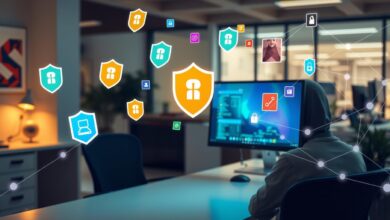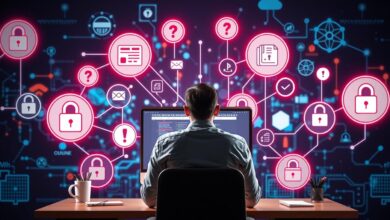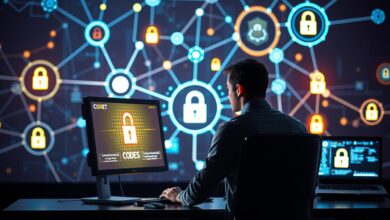Digital Identity Protection in South Africa: Safeguarding Your Online Presence
In today’s world, keeping your digital identity safe is crucial.
South Africa is ranked third in cyber-attacks globally. With more people online, protecting your personal info is key to keeping your privacy safe.
As governments use digital identity for important tasks, South Africans need to watch their online presence. It’s important to protect your personal data to keep your reputation safe from online threats. Knowing the risks of identity theft, like losing money or damaging your credit score, highlights the need for digital protection.
Understanding Digital Identity in South Africa
Digital identity in South Africa is about how we show our online self. It mixes our personal info and online actions into one digital form. This is key for using services online, showing the need for good digital footprint management and data protection.
What is Digital Identity?
Digital identity is our online self, with details like names, addresses, and emails. It helps us use services online smoothly. South Africa’s Department of Home Affairs is working on better ways to verify identities, making online privacy better.
Key Components of Digital Identity
- Usernames and passwords
- Biometric information (fingerprints, facial recognition)
- Government-issued credentials (e.g., ID numbers)
- Electronic signatures and digital stamps
- Online behaviors and transaction history
Knowing these parts is key to managing our digital identity. Using strong passwords and safe login methods helps avoid identity theft and fraud.
The Importance of Digital Identity
Digital identity is very important in South Africa’s fast-changing digital world. It helps in many ways, like:
- Quick access to government and private services
- Boosting online privacy in South Africa by making transactions safe
- Helping more people join the digital economy
The new way of handling digital identity keeps our data safe. It also makes using the internet easier and more personal, showing how important digital footprint management is.
The Growing Threat of Identity Theft
The digital world in South Africa is facing a big problem with identity theft. People and companies are at risk as hackers get better at what they do. Knowing the numbers shows just how serious this issue is.
Current Statistics in South Africa
Identity theft online in South Africa is getting worse fast. Many South Africans have had their identities stolen. This problem is not getting better because we don’t have a good digital identity system yet.
Common Methods of Identity Theft
Hackers use many ways to steal identities. Some common methods include:
- Phishing attacks that trick people into sharing personal info.
- Social engineering tricks that get users to give out private data.
- Malware that sneaks onto devices to steal sensitive info.
With new tech like generative AI, hackers can make fake identities that look real.
Impact on Individuals and Businesses
Identity theft can really hurt people and companies. For individuals, it can mean big financial losses and emotional pain. It can also hurt their credit scores for a long time.
Businesses face problems too. They might lose customer trust and face legal issues because of data breaches. It’s important to have good ways to report identity theft in South Africa.
Legal Framework for Identity Protection
South Africa has a strong legal framework for protecting identities. This is thanks to the Protection of Personal Information Act (POPIA). It started on July 1, 2020, after a grace period ended on June 30, 2021. The goal is to keep personal data safe and prevent identity theft.
Overview of South African Data Protection Laws
The POPIA is a big step forward in protecting identities in South Africa. It tells organizations how to handle personal data. This includes how to collect, store, and process it.
The act also talks about data subject rights and breach notifications. These steps help protect privacy and hold organizations accountable.
Importance of the Protection of Personal Information Act (POPIA)
POPIA is key in fighting identity theft. It sets strict rules for handling personal data. Businesses must follow these rules to keep data safe.
This act makes online transactions safer. It helps reduce identity theft and builds trust in digital spaces.
Role of the Information Regulator
The Information Regulator is vital in enforcing POPIA. It started on December 1, 2016. This body makes sure organizations follow the law.
It guides on data protection, helps with complaints, and promotes awareness. This helps protect personal information and individual rights.
Best Practices for Securing Digital Identity
In today’s digital world, keeping your online presence safe is key. Following account security best practices can greatly improve your digital safety. It’s important to use strong passwords, keep software updated, and watch out for phishing scams.
Strong Passwords and Authentication Methods
Having a strong password is essential for security. Your password should mix letters, numbers, and symbols to avoid being easily hacked. Using password management tools helps keep your passwords safe.
Adding two-factor authentication SA adds an extra layer of protection. This makes it hard for hackers to get in, even if they guess your password.
Regular Software Updates and Security Patches
Keeping your software up to date is crucial for digital safety. Software updates often include fixes for security issues. If you ignore these updates, you risk exposing your system to cyber threats.
Make sure all your apps, operating systems, and security software are current. This is one of the best ways to protect your digital identity.
Recognizing Phishing Attempts
Being aware of phishing scams is important to avoid identity theft. Phishing scams try to look like real messages to get your personal info. Learning to spot these scams is key.
Training and resources that teach about phishing can be very helpful. Knowing how to recognize these scams helps keep your digital identity safe.
The Role of Technology in Digital Identity Protection
Technology is key in keeping digital identities safe, especially for online reputation. It helps people and businesses protect their info from cyber threats. Knowing how these tools work can make security better and lower risks.
Use of VPNs and Secure Browsing
Virtual Private Networks (VPNs) are important for safe browsing. They hide your IP address, making it hard for others to track you. This privacy helps stop unauthorized access to your info. Also, using HTTPS websites adds more protection against data leaks.
Identity Theft Protection Services
Identity theft protection services are crucial for watching your online activity. They notify you if someone uses your personal info without permission. This lets you act fast. Their ability to spot and report suspicious activity adds to your digital safety.
Cloud Storage Security Measures
Cloud storage needs strong encryption and access controls to keep data safe. Secure settings help keep your info away from hackers. By focusing on security in cloud storage, you can keep your important data safe from theft and fraud.
Choosing the Right Digital Identity Management Tools
Choosing the right digital identity management tools is key for better online security. As online threats grow, it’s important to know the tools available to protect our digital selves. There are many tools that make managing identities easier and safer with advanced features.
Overview of Popular Tools Available
There are many digital identity management tools out there. Password management tools are especially useful, making it easier to handle complex passwords. Companies like Contactable use biometrics like facial and voice recognition to boost security in finance and retail.
Features to Look for in Management Tools
When picking digital identity management tools, look for these features:
- Password Generation: Tools should make strong, unique passwords for each account.
- Secure Storage: It’s crucial to store passwords and sensitive info safely.
- Two-Factor Authentication: This adds extra security by needing more than one confirmation to access.
- User Activity Monitoring: Tools that track user actions can spot suspicious behavior early.
- Integration: Choose tools that work well with your current systems and services.
Comparing Costs and Benefits
Costs for digital identity management tools vary a lot. Companies should weigh the costs against the benefits each tool offers. A good identity and access management (IAM) tool can save money in the long run by reducing data breach risks and meeting regulations. Microsoft Azure Active Directory, for example, offers flexibility and works well with cloud and hybrid IT setups.
Developing an Emergency Response Plan
Creating an emergency response plan is key for anyone worried about identity theft. Quick actions can greatly impact the outcome if someone thinks their digital identity has been stolen. Having a plan lets people respond fast and well.
Steps to Take in Case of Identity Theft
Here are steps to help recover from identity theft:
- Write down all important details about the theft.
- Call banks to report any odd activities.
- Tell credit bureaus to put fraud alerts on your report.
- Freeze your credit to stop new accounts from being made.
- Report the crime to the police and file a report.
Importance of Regular Monitoring
Keeping an eye on your accounts is crucial. Staying alert helps spot odd activity early. Services that watch your credit can send alerts for big changes. This is key to keeping safe and reporting identity theft quickly if needed.
Reporting Identity Theft in South Africa
Knowing how to report identity theft in South Africa is important. People should learn about the right authorities and follow the law. Good reporting helps fix the problem fast and reduces the harm of identity theft.
The Role of Education and Awareness
Education and awareness are key in fighting identity theft and keeping the internet safe. Learning about digital literacy helps people understand online dangers. This knowledge leads to better choices, making our online world safer.
Importance of Digital Literacy
Digital literacy teaches people about the digital world and its threats. Knowing about online safety helps protect personal info. It makes both personal and work online interactions safer. In South Africa, a 36% rise in online banking fraud shows why digital literacy is so important.
Community Programs on Digital Safety
Community programs are vital for teaching safe online habits. The Cyber-Security Awareness Community-Engagement Project, led by UNISA, holds workshops for the young. These programs help spread the word about staying safe online.
Resources for Individuals
Having access to online safety tips is crucial for protecting digital identities. Workshops, websites, and academic alliances play a big role. They give people the tools to stay safe online, making the digital world safer for everyone.
Trends Influencing Digital Identity Protection
The world of digital identity protection is changing fast. New technologies and shifting views on online privacy are leading the way. These changes are creating a new era for managing digital identities for both people and companies.
Emerging Technologies in Cybersecurity
Artificial intelligence and blockchain are changing cybersecurity. They offer powerful tools for checking identities and boosting security. By using these technologies, companies can keep data safe and lower the risk of identity theft.
The Future of Digital Identity Management
The future of managing digital identities looks bright. It will use automation and analytics to make things easier. Companies are starting to see the need for stronger security.
With the help of automated tools, businesses can fight off data breaches. They can also keep a closer eye on user identities and sensitive info.
Cultural Attitudes Towards Online Privacy
People’s views on online privacy are changing. There’s more awareness about digital footprints and personal data rights. As more people use the internet, keeping digital identities safe is crucial.
This shift in thinking highlights the need for good digital identity management. It’s key to protecting personal information.
Conclusion: The Importance of Ongoing Vigilance
In the fast-changing world of online privacy in South Africa, staying alert is key to keeping digital identities safe. Using strong passwords, keeping software up to date, and knowing the laws about digital identity are important steps. These actions help fight against identity theft.
Experts from all walks of life agree on the need for strong defenses against cyber threats. This includes 200 government officials, 100 industry experts, and 100 fraud victims. Their input shows how crucial it is to have effective strategies against cyber attacks.
Recap of Best Practices
Securing digital identities starts with good practices. Strong passwords and two-factor authentication are the first steps. Regularly checking accounts and spreading awareness are also important.
These steps help people protect their data. As technology evolves, staying ready is more important than ever.
Encouraging Proactive Measures
It’s important to encourage people to take action to stay safe online. Teaching digital literacy and supporting safety programs can help. This way, South Africa can fight identity crimes better.
Working together, citizens, businesses, and governments can make the internet safer. This teamwork is essential for a secure digital future.
Final Thoughts on Digital Identity in South Africa
Protecting digital identities is everyone’s job. With South Africa’s big population and many provinces, it’s vital to improve identity checks and digital rules. Staying vigilant and taking action can make the internet safer for everyone.
FAQ
What is digital identity protection?
Digital identity protection is about keeping your personal info safe online. It involves managing your usernames, passwords, and sensitive data. This is to stop identity theft and keep your online privacy.
Why is digital identity protection important in South Africa?
In South Africa, cyber attacks are common. This makes people’s personal info at risk. Protecting your digital identity keeps your privacy and security safe online.
What are some common methods of identity theft?
Identity theft can happen through phishing, social engineering, and malware. These methods can let hackers get to your personal info and cause financial loss.
What legal protections exist for identity theft victims in South Africa?
The Protection of Personal Information Act (POPIA) helps protect your personal data. It makes sure your rights are looked after.
What best practices should individuals follow to secure their digital identity?
To keep your digital identity safe, use strong passwords and two-factor authentication. Also, keep your software up to date and watch out for phishing scams.
How can technology assist in protecting digital identities?
Technology like VPNs, identity theft protection services, and secure browsing can help. They reduce the risk of cyber threats and protect your personal info.
What features should individuals look for in digital identity management tools?
Look for tools that can generate strong passwords, store them securely, and offer two-factor authentication. They should also be affordable and meet your security needs.
What steps should be taken if identity theft is suspected?
If you think you’ve been a victim of identity theft, document everything. Tell your bank and report it to the police right away. Always check your accounts and credit reports regularly.
How can education and community programs assist in safeguarding digital identities?
Education and community programs can help a lot. They teach people about online privacy and how to stay safe online. This empowers individuals to protect themselves better.
What are the future trends in digital identity protection?
New technologies like artificial intelligence and blockchain are changing how we protect our digital identities. They aim to make security better and raise awareness about online privacy rights.
Published on: 7 de December de 2024

Bakari Romano
Bakari Romano is a finance and investment expert with a strong background in administration. As a dedicated professional, Bakari is passionate about sharing his knowledge to empower individuals in managing their finances effectively. Driven by this mission, he founded FinancasPro.com, where he provides insightful and practical advice to help people make informed financial decisions. Through his work on the site, Bakari continues to make finance accessible and understandable, bridging the gap between expert knowledge and everyday financial needs.






